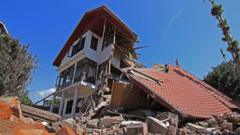In response to last week's massacre, which marked the deadliest civilian casualties in the region in twenty years, Indian forces are demolishing the homes of suspected militants and detaining numerous individuals for questioning.
India's Security Forces Crack Down in Kashmir Following Deadly Attack

India's Security Forces Crack Down in Kashmir Following Deadly Attack
Authorities in Kashmir are intensifying operations against alleged militants amid rising tensions after a deadly attack that claimed 26 lives.
Authorities in Indian-administered Kashmir have intensified their crackdown on suspected militants following a horrific attack that left 26 dead. Since last week, security forces have demolished the homes of at least ten alleged militants and detained numerous individuals as part of their investigations. The operation follows a tragic incident where gunmen targeted tourists near the popular town of Pahalgam, representing the gravest assault on civilians in the region for two decades. Indian authorities accuse Pakistan of harboring these militants, although no specific group has been identified, leading Islamabad to categorically deny these claims.
The demolitions commenced last Thursday, with some of the destroyed properties linked directly to suspects identified by the police. Covertly termed "bulldozer justice," this demolition policy has been criticized by local leaders who argue it punishes innocent families and causes further harm. Jammu and Kashmir Chief Minister Omar Abdullah emphasized the need for justice without harming bystanders, echoing sentiments from former chief minister Mehbooba Mufti, who implored the government to differentiate between militants and civilians.
The chaos has also negatively impacted the Kashmiri community in India, with reports of intimidation and harassment of students from Kashmir amid rising communal tensions following the attack. Additional details reveal that three of the alleged attackers have been identified, with two confirmed as Pakistani nationals, while the affiliation of the fourth suspect remains unknown.
In a considerable escalation following the attack, diplomatic relations between India and Pakistan are deteriorating, with Indian authorities announcing the suspension of the 1960 Indus Waters Treaty provoking harsh protests from Pakistan, which sees it as an act of war. In retaliation, Pakistan has suspended a bilateral agreement aimed at peaceful dispute resolution.
As bullets fly across the Line of Control, tensions have heightened dramatically, with both countries expelling diplomats and placing restrictions on civilians. Indian Prime Minister Narendra Modi vowed to pursue justice relentlessly, stating that peace efforts in the region have been undermined by this act of violence. The U.S. government is urging both sides to seek a peaceful resolution, reflecting growing international concern over peace in the subcontinent.
The demolitions commenced last Thursday, with some of the destroyed properties linked directly to suspects identified by the police. Covertly termed "bulldozer justice," this demolition policy has been criticized by local leaders who argue it punishes innocent families and causes further harm. Jammu and Kashmir Chief Minister Omar Abdullah emphasized the need for justice without harming bystanders, echoing sentiments from former chief minister Mehbooba Mufti, who implored the government to differentiate between militants and civilians.
The chaos has also negatively impacted the Kashmiri community in India, with reports of intimidation and harassment of students from Kashmir amid rising communal tensions following the attack. Additional details reveal that three of the alleged attackers have been identified, with two confirmed as Pakistani nationals, while the affiliation of the fourth suspect remains unknown.
In a considerable escalation following the attack, diplomatic relations between India and Pakistan are deteriorating, with Indian authorities announcing the suspension of the 1960 Indus Waters Treaty provoking harsh protests from Pakistan, which sees it as an act of war. In retaliation, Pakistan has suspended a bilateral agreement aimed at peaceful dispute resolution.
As bullets fly across the Line of Control, tensions have heightened dramatically, with both countries expelling diplomats and placing restrictions on civilians. Indian Prime Minister Narendra Modi vowed to pursue justice relentlessly, stating that peace efforts in the region have been undermined by this act of violence. The U.S. government is urging both sides to seek a peaceful resolution, reflecting growing international concern over peace in the subcontinent.






















